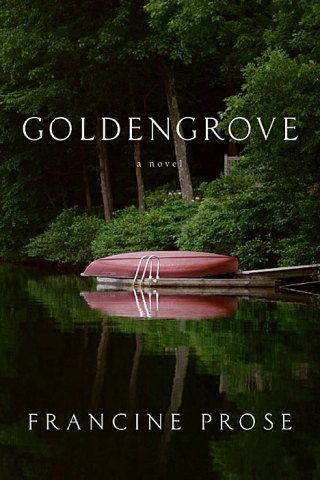Goldengrove
by Francine Prose
HarperCollins, $24.95
“We lived on the shore of Mirror Lake, and for many years our lives were as calm and transparent as its waters … When I think of that time, I picture the four of us wading in the shallows, admiring our reflections in the glassy, motionless lake. Then something – a pebble, a raindrop – breaks the surface and shatters the mirror. A ripple reaches the distant bank. Our years of bad luck begin.”
Nico is 13 when her older sister Margaret, the shining star of their small New England town, dies unexpectedly. Margaret was an accomplished singer, lover of old films, and adored sister and daughter on the brink of adulthood when she drowns a few weeks before summer. A graduating senior, she was to attend music school in the fall.
The death of someone so luminous sends those closest to Margaret into dangerous depths of sadness. Nico’s father, who owns the bookstore in town called “Goldengrove,” and her mother, a piano player, are former hippies who each retreat to their own kind of solace. Nico is left momentarily unattended, alone with her longing for Margaret and dreams that leave her “seasick, drenched, and shipwrecked, as if the knotted sheets were a sail on which I’d washed ashore.”
Margaret’s unstable boyfriend, Aaron, becomes the most unhinged. The other town superstar, Aaron is an artist who destroys all of his paintings and slowly sinks deeper into his grief. He latches onto Nico, forming a questionable relationship tinged with sexual attraction and obsession. Nico writes of Aaron:
“Aaron drove smoothly, with his elbow out the window, his James Dean equivalent of Margaret’s old-movie steals. Oh, they were made for each other! I wondered if Aaron ever thought that he would ever find someone so perfect, and that he might search his entire life for that smile, that voice, that laugh.”
The first half of the book is one haunting, eloquent love letter to Margaret, as Nico recalls the many blissful – and feisty – memories she has of her older sister. With her blonde beauty, velvet singing voice, and film star charisma, Margaret is the ultimate icon to worship. Like all worthwhile adolescent narrators, Nico is wise beyond her years, and her plodding journey through grief is at turns sharply aware and heartbreakingly lost. Nico seems to handle the situation much better than her parents. She views them with a combination of detachment and concern, acknowledging there is nothing she can do to soften their anguish.
“Goldengrove” is Prose’s most polished work to date. She keeps her ability to write a compelling story, but unlike “A Changed Man,” my favorite Prose novel, she has written a less choppy, more fluid book.
I’ve always counted on Prose to write unsentimental yet emotional stories, and this novel is no exception. It sounds like the ultimate sobfest, and while it is certainly sad, the story is buoyed by Nico’s youth, her emergence as a young woman amidst the family’s turmoil, and her humor. Nico also uses art as a vehicle for understanding her sister and getting through the pain of living. Looking at a book of Sienese art, Nico turns to the paintings of saints resurrecting drowned children:
“Margaret HAD been born too late. She’d meant too late for the jazz standards, the screwball comedies, the satin gowns. But she’d been off by the centuries. Too late for the lifeguard saint.”



